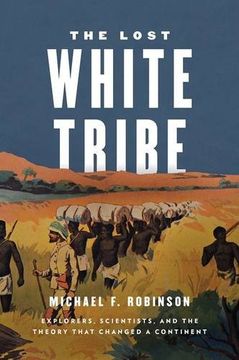Share
The Lost White Tribe: Explorers, Scientists, and the Theory that Changed a Continent (in English)
Michael F. Robinson
(Author)
·
Oxford University Press, USA
· Hardcover
The Lost White Tribe: Explorers, Scientists, and the Theory that Changed a Continent (in English) - Robinson, Michael F.
$ 22.39
$ 31.99
You save: $ 9.60
Choose the list to add your product or create one New List
✓ Product added successfully to the Wishlist.
Go to My WishlistsIt will be shipped from our warehouse between
Friday, May 31 and
Monday, June 03.
You will receive it anywhere in United States between 1 and 3 business days after shipment.
Synopsis "The Lost White Tribe: Explorers, Scientists, and the Theory that Changed a Continent (in English)"
In 1876, in a mountainous region to the west of Lake Victoria, Africa--what is today Ruwenzori Mountains National Park in Uganda--the famed explorer Henry Morton Stanley encountered Africans with what he was convinced were light complexions and European features. Stanley's discovery of this African "white tribe" haunted him and seemed to substantiate the so-called Hamitic Hypothesis: the theory that the descendants of Ham, the son of Noah, had populated Africa and other remote places, proving that the source and spread of human races around the world could be traced to and explained by a Biblical story. In The Lost White Tribe, Michael Robinson traces the rise and fall of the Hamitic Hypothesis. In addition to recounting Stanley's "discovery," Robinson shows how it influenced encounters with the Ainu in Japan; Vilhjalmur Stefansson's tribe of "blond Eskimos" in the Arctic; and the "white Indians" of Panama. As Robinson shows, race theory stemming originally from the Bible only not only guided exploration but archeology, including Charles Mauch's discovery of the Grand Zimbabwe site in 1872, and literature, such as H. Rider Haggard's King Solomon's Mines, whose publication launched an entire literary subgenre ded icated to white tribes in remote places. The Hamitic Hypothesis would shape the theories of Carl Jung and guide psychological and anthropological notions of the primitive. The Hypothesis also formed the foundation for the European colonial system, which was premised on assumptions about racial hierarchy, at whose top were the white races, the purest and oldest of them all. It was a small step from the Hypothesis to theories of Aryan superiority, which served as the basis of the race laws in Nazi Germany and had horrific and catastrophic consequences. Though racial thinking changed profoundly after World War Two, a version of Hamitic validation of the "whiter" tribes laid the groundwork for conflict within Africa itself after decolonization, including the Rwandan genocide. Based on painstaking archival research, The Lost White Tribe is a fascinating, immersive, and wide-ranging work of synthesis, revealing the roots of racial thinking and the legacies that continue to exert their influence to this day.

